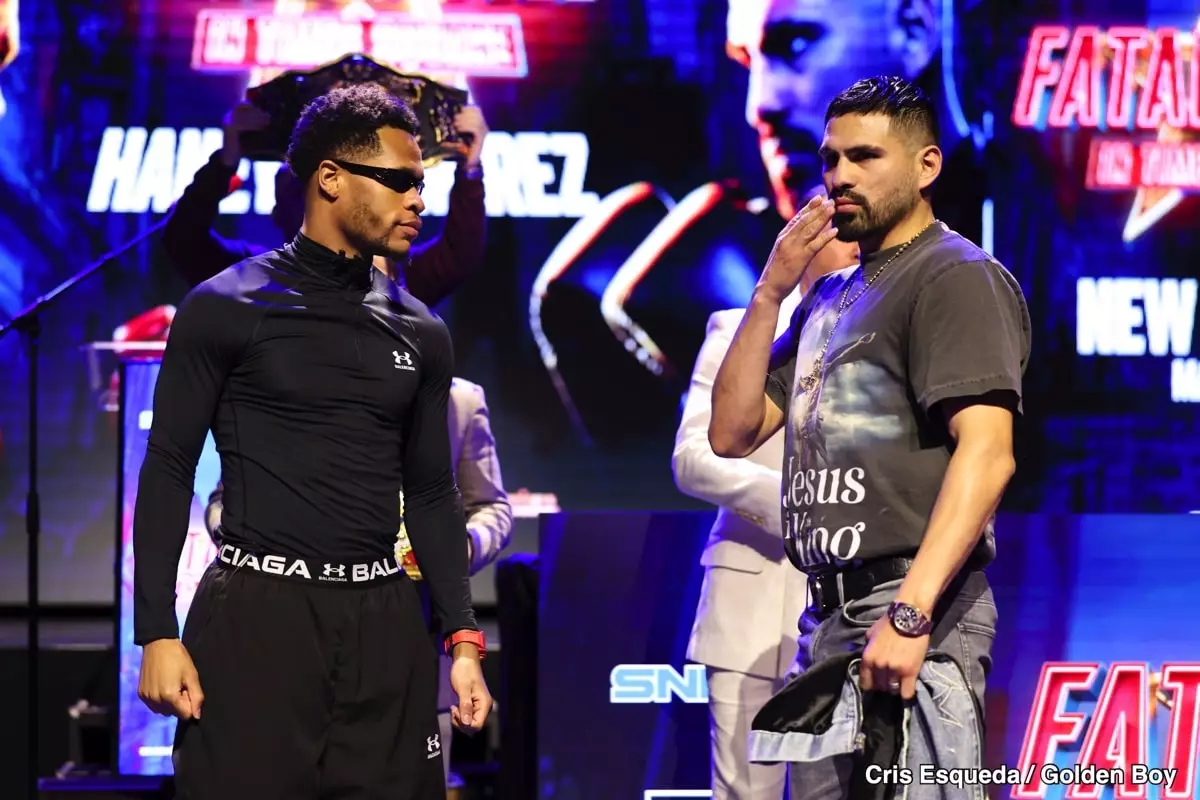In the high-stakes world of professional boxing, the choice of an opponent can define a fighter’s career trajectory, especially after a significant loss. Following his defeat to Ryan Garcia, Devin Haney has opted to face former champion Jose Ramirez on May 2nd in New York’s Times Square. This decision is not without its critics, with Gabe Rosado being one of the most vocal, labeling Ramirez as a “wrong choice.” Such assertions highlight the delicate balance fighters must strike between ambition and caution, particularly in the aftermath of a lengthy layoff.
Choosing a challenging opponent in a comeback fight can be a double-edged sword. On the one hand, a decisive victory can restore a fighter’s standing and fanbase; on the other, too ambitious a choice can lead to further humiliation. Haney’s pick of Ramirez, a fighter with notable punching power and experience, raises eyebrows. Rosado’s concern points to the inherent risks associated with taking on a formidable opponent after a year-long absence from the ring.
Analyzing Jose Ramirez’s Capabilities
Rosado’s argument is not baseless. While Ramirez’s recent performance includes a loss to Arnold Barboza Jr., he remains a highly skilled and dangerous competitor. Ramirez’s background as a former WBC and WBO champion substantiates the claims about his prowess in the ring. Additionally, losing a close decision in a fight that could have gone either way further complicates the narrative surrounding his potential. In boxing, an opponent who is fighting at a high level—even in defeat—can be a more daunting challenge than a win on paper might suggest.
It seems that Haney and his father, Bill, may have underestimated the residual threat posed by Ramirez. The perception, as noted by Rosado, that Ramirez may be marked as a stepping stone due to recent setbacks carries significant risk. The boxing world operates under a harsh reality: one poorly judged fight can rapidly unravel months or years of effort in the ring.
Haney’s Psychological and Emotional Landscape
Rosado’s critiques also touch upon the psychological machinations that accompany a fighter’s decision-making process post-defeat. The mental burden that comes after a loss can lead fighters to make choices driven by emotion rather than strategic analysis. Haney’s journey after his loss to Garcia showcases this complexity. Rosado pointed out that Haney’s subsequent actions—such as his lawsuit against Garcia—might suggest an inability to embrace the inherent risks of the sport. Boxing is unforgiving; it thrives on resilience and the capacity to adapt after setbacks.
There comes a time when emotional reactions can cloud judgment, leading to decisions that may not align with a fighter’s long-term goals. In stating that he was supportive of Haney leading up to the Garcia fight, Rosado highlights a key aspect of sportsmanship: the fine line between support and truth-telling. This father-son dynamic may be fostering a bubble of encouragement that fails to acknowledge tactical missteps—a dangerous place for any athlete.
The Broader Implications for Boxers Moving Forward
For fighters like Haney, the path back to glory requires an acute understanding of the landscape they operate within. The conversation surrounding Haney and Ramirez depicts more than just a matchup; it’s indicative of a larger theme in boxing. The balancing act between ambition and prudence is crucial for fighters returning from setbacks. Mistakes in judgment can lead to catastrophic outcomes, not only for immediate fights but also for longer-term reputation and marketability within the sport.
Rosado’s critique serves as a reminder to both fans and fighters: the sport is replete with uncertainties, and every fight carries its own set of risks. Therefore, a fighter’s choice of opponent should be rooted in not just skills and statistics but also timing, mental readiness, and overall strategy. A nuanced approach to opponent selection may be the difference between a fighter finding their way back to the top or facing prolonged struggles in a fiercely competitive arena. The boxing world will be watching to see if Devin Haney’s decision proves to be a savvy move or a costly miscalculation.


Leave a Reply